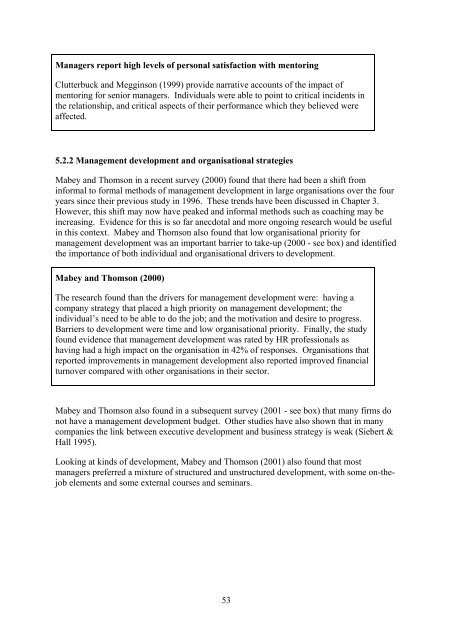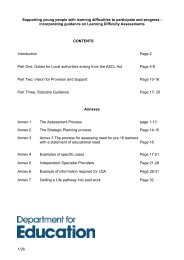The Development of Management and Leadership Capability and its ...
The Development of Management and Leadership Capability and its ...
The Development of Management and Leadership Capability and its ...
Create successful ePaper yourself
Turn your PDF publications into a flip-book with our unique Google optimized e-Paper software.
Managers report high levels <strong>of</strong> personal satisfaction with mentoring<br />
Clutterbuck <strong>and</strong> Megginson (1999) provide narrative accounts <strong>of</strong> the impact <strong>of</strong><br />
mentoring for senior managers. Individuals were able to point to critical incidents in<br />
the relationship, <strong>and</strong> critical aspects <strong>of</strong> their performance which they believed were<br />
affected.<br />
5.2.2 <strong>Management</strong> development <strong>and</strong> organisational strategies<br />
Mabey <strong>and</strong> Thomson in a recent survey (2000) found that there had been a shift from<br />
informal to formal methods <strong>of</strong> management development in large organisations over the four<br />
years since their previous study in 1996. <strong>The</strong>se trends have been discussed in Chapter 3.<br />
However, this shift may now have peaked <strong>and</strong> informal methods such as coaching may be<br />
increasing. Evidence for this is so far anecdotal <strong>and</strong> more ongoing research would be useful<br />
in this context. Mabey <strong>and</strong> Thomson also found that low organisational priority for<br />
management development was an important barrier to take-up (2000 - see box) <strong>and</strong> identified<br />
the importance <strong>of</strong> both individual <strong>and</strong> organisational drivers to development.<br />
Mabey <strong>and</strong> Thomson (2000)<br />
<strong>The</strong> research found than the drivers for management development were: having a<br />
company strategy that placed a high priority on management development; the<br />
individual’s need to be able to do the job; <strong>and</strong> the motivation <strong>and</strong> desire to progress.<br />
Barriers to development were time <strong>and</strong> low organisational priority. Finally, the study<br />
found evidence that management development was rated by HR pr<strong>of</strong>essionals as<br />
having had a high impact on the organisation in 42% <strong>of</strong> responses. Organisations that<br />
reported improvements in management development also reported improved financial<br />
turnover compared with other organisations in their sector.<br />
Mabey <strong>and</strong> Thomson also found in a subsequent survey (2001 - see box) that many firms do<br />
not have a management development budget. Other studies have also shown that in many<br />
companies the link between executive development <strong>and</strong> business strategy is weak (Siebert &<br />
Hall 1995).<br />
Looking at kinds <strong>of</strong> development, Mabey <strong>and</strong> Thomson (2001) also found that most<br />
managers preferred a mixture <strong>of</strong> structured <strong>and</strong> unstructured development, with some on-thejob<br />
elements <strong>and</strong> some external courses <strong>and</strong> seminars.<br />
53
















